The Gambia Plan – Beyond empty words and threats: how a breakthrough is possible
Dear friends,
Last week a delegation of leading members of parliament from The Gambia, West Africa's youngest democracy, visited Germany together with ESI in search of a historic agreement.
The delegation met ministers, state secretaries and members of parliament in Berlin and in Stuttgart, capital of the state of Baden-Württemberg, where most Gambians residing in Germany live. It also met members of the Gambian diaspora.
Momentum behind the Gambia-Germany Plan
The MPs came to discuss a concrete proposal. In July 2019 ESI had proposed a Gambia-Germany Plan for Migration and Development which met a positive response in both countries. A number of German MPs endorsed it publicly. German ministries have since discussed it internally. Gambian ministers and civil society organisations endorsed it. So did the Gambian vice president in a meeting with ESI in December 2019.
That same month ESI was invited to present the plan in the Gambian parliament, where it was praised. Cheikh Sidiya Jatta, the chair of the foreign affairs committee endorsed it publicly.
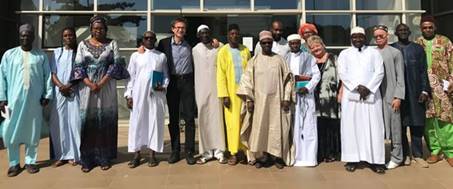
Outside the National Parliament in Banjul after ESI presentation
On 21 January 2020 Patrick Sensburg, a CDU member of the Bundestag, wrote to Sidiya Jatta:
"Following a number of conversations recently … I would be very interested to reach out to you to explore how we, parliamentarians in Berlin and Banjul, can contribute to resolving a number of outstanding issues in a way that is beneficial to our constituents and citizens.
I would also like to ask you whether you believe that the elements described in the ESI Gambia-Germany plan, with which you are familiar, would be a good basis for further discussion. And whether you and other Gambian MPs would be able and interested in meeting with me and other German MPs soon, either in Germany and in The Gambia, to take this discussion further. It would be my honour and pleasure to see us, as members of our parliaments with our colleagues, take the relationship between our countries to a different level of friendship."
In response Gambian MPs announced their visit to Berlin and to Stuttgart, the capital of Baden-Württemberg. Sidiya Jatta also wrote to the Prime Minister (Green Party) and Minister of Interior (CDU) of Baden-Württemberg:
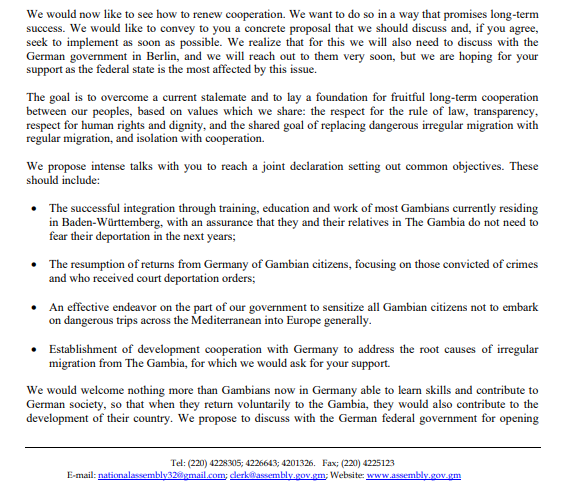
Letter from Chairman Sidiya Jatta to the leaders of Baden-Württemberg
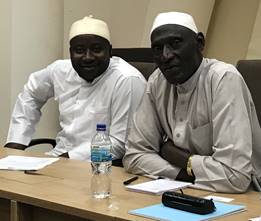
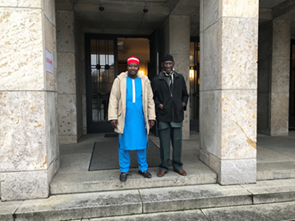
MPs Billay Tunkara and Sidiya Jatta – in Banjul and in Berlin, in search of solutions
With high expectations, yet aware of the challenge of reaching an agreement that needs to be popular in both countries, stop future irregular migration and create a strategic partnership for the future, the delegation arrived in Berlin on 10 February.
The stakes
The stakes are high: to stop migrant deaths at sea, to end the irregular status of thousands of Gambians already in Europe, and to help turn The Gambia into an African success story.
No other country in Africa saw as many of its citizens cross the Mediterranean between 2013 and 2018 than this small nation of just above 2 million inhabitants. Some 40,000 Gambians reached Europe in those years. Many who succeeded suffered in the Sahara, where people fell off trucks and were left to die in the desert, and then at the hands of smugglers and militias in Libya. An estimated 1,000 perished at sea. These are enormous casualty figures. They traumatized a small nation.
During this short period one in fifty Gambians left the country. Hundreds of thousands of family members were left behind with deep and conflicting emotions. They want to see their loved ones again. They do not want to see other children embark again on such deadly trips. And they oppose seeing those of their relatives who made it to Europe being brought back in chains, deported on European charter flights, rendering their suffering and effort meaningless.
When most of these young Gambians left, the country was one of the most repressive states in West Africa. After 22 years of one-man rule it was also one of the poorest and most isolated. Then Gambians produced a political miracle: a peaceful, negotiated transition, following an election in early 2017, turned The Gambia into a democracy with free speech and an influential parliament. In this transition the diaspora played an important role.
The country is still poor. It is still isolated. But it is now a place of hope. It is also a society where public opinion matters.
Recently Gambian emigration fell sharply. Today young Gambians, who returned home from Libya since 2017, warn their compatriots not to embark on the dangerous "back-way".
(See this video with a leader of Youth Against Irregular Migration)
There are almost no Gambians heading to Libya today. There are only a few who still try to reach Spain via Morocco. However, smugglers are trying to sell deadly trips in small fishing vessels across the Atlantic to the Spanish Canary Islands, often with horrific consequences. In early December 2019 more than 50 young people drowned in the Atlantic.
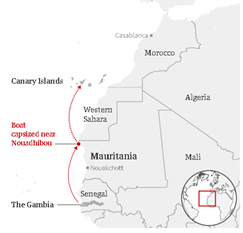
A deadly route – how to stop this
One goal of a humane migration policy must be to stop such accidents and to cut down on deadly irregular migration. One way to achieve this is to reach an agreement, so that the Gambian government is prepared to take back quickly any of its citizens who leave in the future and do not qualify for protection. And this, to be of mutual benefit, must be accompanied by serious support for development and by increasing possibilities for legal migration and scholarships.
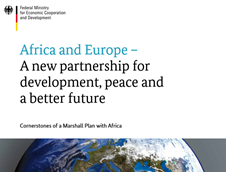
These are also the principles of the German Marshall Plan with Africa, presented in 2017. There the Ministry of Economic Cooperation and Development stated as its priority:
"Africa's young people also need contact and interaction with Europe. Europe must develop a strategy that allows for legal migration whilst combating irregular migration and people smuggling."
Creating contacts and stopping people smuggling are worthy goals. There is one problem, however. There is not one concrete example today where either Germany or the EU achieved this in Africa in recent years: allowing for legal while combatting irregular migration. Proving somewhere that this could work should be a German priority in 2020.
The Gambia, a country that experienced a lot of irregular migration and whose citizens have almost no prospects of regular mobility, is a reality check. If it is not possible to implement the values of the Marshall Plan with Africa here, in this young democracy and small society, in a way that is seen as positive by both Germans and Gambians, then it is probably not possible anywhere. Then fine words and conferences will not have changed much.
The deportation fantasy
In fact, there is a real danger today that instead of a win-win solution, EU policy on auto-pilot is so focused on deportations that it might do real harm, punishing and sanctioning The Gambia for something that is happening across all of Africa: refusing to take back large numbers of its nationals from Europe.
During their meetings in Germany Gambian MPs made clear that it is completely unrealistic to expect their country to cooperate in the deportation of thousands of its citizens. No country in West Africa is doing this today. And Germans assured them that Germany had every interest in stability in The Gambia and that there would be no mass deportations.
In 2018 Germany deported the following number of people to these sub-Saharan African countries:
|
|
Deported |
Population |
|
Ghana |
210 |
31 million |
|
Nigeria |
193 |
206 million |
|
The Gambia |
144 |
2 million |
|
Senegal |
16 |
17 million |
|
Guinea |
16 |
2 million |
|
Togo |
5 |
8 million |
Note that in no country in Africa the issue of deportations is more politically sensitive than in The Gambia. Nowhere as large a share of the population is directly affected. Many Gambian ministers and MPs know somebody in their own family who made his way to Europe in these past years. This is personal.
Also note that taking into account the size of its population, no other African country was more cooperative in taking back its citizens in 2018 than The Gambia. Nigeria is 100 times more populous and took back a similar number.
Nonetheless, in early 2019 the EU and some member states decided that 144 was too little. Although the Gambian government wrote to the German authorities on 23 February asking them to slow down the number of deportations each month, this letter was ignored. On 25 February 2019 20 people arrived in Banjul airport in one charter flight, triggering massive protests throughout the country. Many more deportations of 20 people per flight were then planned. The government responded with a very popular moratorium on all further returns.
In May 2019 an EU delegation put a proposal on the table in Banjul demanding agreement to cooperate in the forced return of 1,200 Gambians within one year from Europe.
The moratorium was lifted in October 2019. But the Gambian government is still not giving permission for deportation charter flights to land. It fears protests. It also feels that EU pressure is unfair, singling out The Gambia.
The folly of EU sanctions
EU sanctions could take different forms. One would be to reduce economic assistance. Gambia is one of the poorest countries in Africa. Does it make any sense to single it out and punish it for resisting something other West African countries resist as well, only because it is smaller? Cui bono?
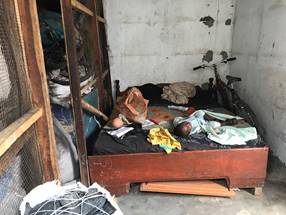
Poverty in The Gambia – not a democracy the EU should sanction
As for visa restrictions, the recently revised EU Schengen Code, paragraph 11 states that "In case of lack of cooperation of certain third countries to readmit their nationals apprehended in an irregular situation and failure of those third countries to cooperate effectively in the return process, a restrictive and temporary application of certain provisions … be applied"
The Hungarian head of the EU delegation in The Gambia recently warned that
"continuing defiance by the government not to take back its citizens as required by international obligations would not only make The Gambia face stringent visa procedures, but it will also 'spoil the overall collaboration'".
The bitter irony: no EU member state has an embassy in The Gambia today. There is not one consulate in Banjul that gives Schengen visa. Any Gambian needs to travel to Dakar, in Senegal, and pay 80 Euro to obtain one, which adds up to high costs unaffordable to almost all Gambians. As a result, almost no one travels to Europe. Why would such a threat lead to a change of policy in this young democracy, where the support of the broader public, not the interests of the very few who might travel, matters? And how is further isolating this Anglophone democracy, where China and Turkey, but not Germany and France, have embassies, a European interest?
It is unlikely that such sanctions, even if carried out, would increase numbers of deportations. No Gambian minister is likely to put his or her signature under such a document. There would certainly be protests. And it would likely destabilise the country.
Politicians in Germany who want real solutions know this. Looking at the number of actual deportations and of voluntary returns of Gambians from Germany in recent years they see this:
|
|
Deportations |
Voluntary return |
|
2016 |
29 |
12 |
|
2017 |
31 |
48 |
|
2018 |
144 |
54 |
|
2019 |
61 |
52 |
There are currently 4,800 Gambians in Germany who are required to leave. There are 1,500 asylum applicants or people whose application is processed at first instance level and 4,900 asylum applications under review. Most of these asylum claims will be rejected. In total more than 11,000 Gambians might be required to leave Germany soon.
If the record year 2018, with 144 deportations and 54 voluntary returns, is the measure than deporting 11,000 people would take 56 years. If it is the last year, 2019, then it would take 97 years. (Both calculations assume that none of the many thousands of Gambians currently in Italy or Spain make their way to Germany.)
Many politicians from the state of Baden-Württemberg, where most Gambians live today, are looking for a real solution. They care about security, want to curtail further irregular migration also from other European countries, and insist on deporting convicted criminals. They want to stop the involvement of (some) Gambians in the drug business and show that control is possible. They realise this will require offering other Gambians in Germany the possibility to learn skills and earn a living. They recognise that cooperation with Banjul requires removing fears of mass deportations, in a way that Gambian society believes.
It helps that there is in fact high demand for labour in Baden-Württemberg, which today has full employment. Many local politicians and entrepreneurs ESI spoke to are begging politicians to find a workable solution. There are already many local Gambian success stories of integration. There is a constituency for being reasonable.
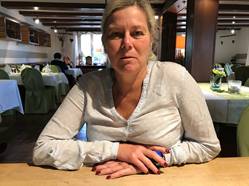
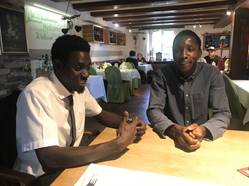
Success stories - two videos:
Entrepreneur (in German)
Gambian workers
For the EU mass deportations to Africa are not a realistic solution. And sanctioning a small, young and isolated democracy would be the bankruptcy of EU Africa policy. But if punitive measures will not work, what might?
A Gambian proposal and next steps
In every meeting these past days Gambian MPs stressed that they wanted to find a solution that would work for both sides. In every meeting German politicians and officials stressed that they needed reliable counterparts.
It has not been helpful on the part of the Gambian government to promise things which it never intended to deliver; to sign a "good practice agreement" with the EU on forced returns, without realising what it might mean; to lift a moratorium on forced returns in October 2019 and then to withdraw landing permissions for every charter requested at the last moment; to negotiate with the EU on deportations of significant numbers while not informing the Gambian public or parliament.
It has not been helpful on the part of the EU to focus on deportations above all else. A recent European proposal to send an international consultant to help the Gambian government with "technical skills to communicate with its citizens" that forced deportations are a good thing is no glorious moment of European diplomacy. It might even appear cynical.
What is needed on all sides for a win-win rather than lose-lose outcome is seriousness. This was the theme of this historic visit.
It is in The Gambia's interest to see its diaspora thrive in Germany. It is not in its interest to see it disappear. It is The Gambia's interest to help those in Germany who want an agreement, and to take back every citizen sentenced in a court for a crime, and without delay. It is not in its interest that its image in Germany is dominated by highly visible drug dealers in parks in a few big cities.
MPs and diaspora representatives agreed on this last week: Gambians abroad should be good ambassadors of their country, which needs friends. German counterparts agreed that their country should be such a friend. Then the diaspora becomes a bridge, not a problem.
It is therefore in The Gambia's interest to sit down and engage in serious and direct talks with German and Baden-Württemberg authorities soon.
A breakthrough is possible. And important for Germany and Europe, which desperately need examples how realism, humanity, respect and interests can stop irregular migration without sacrificing values. May it succeed here, with the help of Banjul.
Best regards,

Gerald Knaus
A visit in pictures – further reading
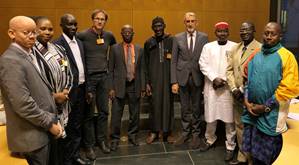
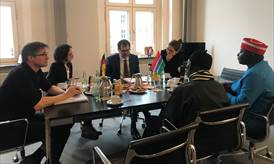
Bundestag with Armin Schuster (CDU) – Ministry of Finance with state secretary Wolfgang Schmidt (SPD)
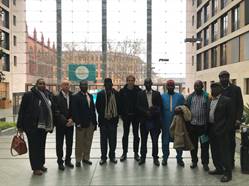
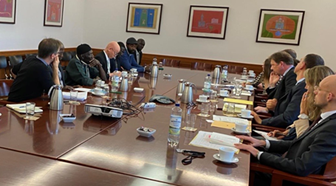
In the German Foreign Office
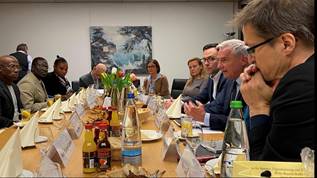
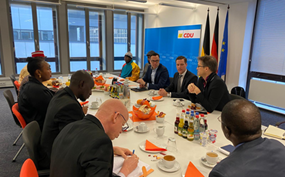
In Stuttgart with the minister of the interior – In Stuttgart with CDU members of state parliament
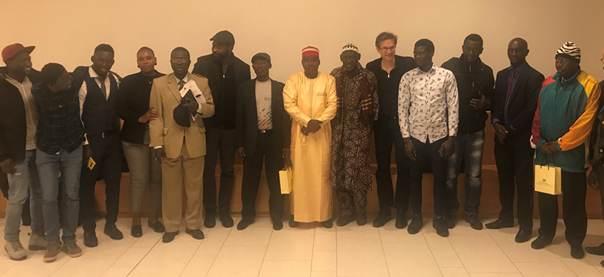
MPs meeting members of the diaspora and the Gambian Refugees Association in Germany
The core of any agreement
The core of the ESI Gambia Plan consists of three measures that should have an immediate impact:
- Remove fear of deportation for Gambians currently in Germany. Give them an opportunity to work and earn money legally and to become a link between two societies.
- Implement the immediate return of those Gambians who committed crimes and were sentenced in courts.
- Announce the commitment by The Gambia to identify and take back citizens who arrive in Germany with no right to stay after a cut-off date (including those who arrive, apply for asylum, and whose claim is rejected).
These measures should give lawful Gambians in Germany now a chance to work and prove themselves. This would need to be announced to reassure these thousands of people and their families back in The Gambia that deportations of criminals will not mean deportations of anyone in large numbers.
It will require work with the government of The Gambia to quickly return those who committed crimes. A start should be made immediately with the ~25 who are on a list of serious foreign criminals in Baden Württemberg (for violent crimes, rapes).
It also requires finding a way to discourage other Gambians, who are not presently in Germany from going there from now on. This requires concretely:
- The Gambia helps identify and gives ID cards to its citizens currently in Germany. Identification is a precondition to be exempt from deportations to other EU countries and to work legally.
- The Gambia and Germany jointly communicate that nobody who is not already in Germany should go there, as The Gambia would agree to take them back directly. Instead of Dublin transfers from Germany to Italy, there would be direct returns to The Gambia from then on. The objective, however, would be that the credibility of such an announcement would stop people arriving, so there would be very few actual deportations required.
This is very important. For Germany to grant those thousands of Gambians who are now there lawful residency and security against deportations, to be able to contribute to society, a way must be found to prevent this creating a pull effect for more people to come who are presently in other European countries. Given Europe's open borders, the only way to achieve this is cooperation with The Gambia.
At the same time Germany and The Gambia agree on a wider strategic partnership with concrete measures for medium-term development cooperation, scholarships, legal migration and enhanced diplomatic cooperation (more on this below). Germany recognises that it has a long-term stake in the success of Gambian democracy. This would have another benefit for The Gambia: in this way other European countries would have a similar interest in an agreement with the Gambia on legal migration and development like the one in Germany.
The outcome would be a virtuous circle:
- The Gambia and Baden-Württemberg reach a declaration on a strategic partnership for legal and against irregular migration. They embrace the goals of the Gambia Plan.
- The government of Baden-Württemberg announces that it grants legal certainty to remain and work to all Gambians presently registered in the state who did not commit crimes.
- The Gambia immediately takes back 25 of its citizens convicted of serious crimes to show that it is serious.
- Other German states where there are Gambians join the declaration.
- The Gambia and German states agree on a schedule and modalities to return all Gambians in an orderly manner who have been sentenced for serious crimes.
- The Gambia and Germany announce a series of measures that increase mobility from the Gambia to Germany: to triple the number of DAAD (MFA) scholarships for Gambians in Germany, to create training schemes for skills in The Gambia that allow future legal migration.
- The Gambia and Germany agree that every Gambian who arrives in Germany after the date of the declaration, and who has no right to stay, will be deported directly to The Gambia. They announce this, in order to discourage people from coming.
- The Gambia approaches other countries (Spain, Italy, Austria, Switzerland) and offers them similar cooperation on migration, in return for support.
Other measures to propose for a joint declaration:
- Development cooperation: the German ministry of development (BMZ) to make The Gambia a priority country for German bilateral development cooperation, which makes it possible to carry out many more (also bilateral) projects. And to focus on some high-profile cooperation to develop infrastructure for key economic (such as tourism) and social sectors (health care).
- Legal paths: for Germany to increase the number of official (DAAD) scholarships for Gambian students, to organise exchange for young people, to create and support partnerships between education institutions in both countries. And to set up vocational training facilities in The Gambia that would also make it possible for Gambian citizens to meet requirements for legal work migration under the new German Facharbeitereinwanderungsgesetz (Trained workers immigration law) that enters into force in 2020.
- Diplomatic presence: in order to implement the migration agreement and other development measures both The Gambia and Germany need to intensify cooperation. This might include a full German embassy in Banjul, a Goethe Institute (currently there is a German cultural institute only in Dakar) for certified German language courses, and a consulate offering Schengen visa in Banjul, to reduce the costly trips to the German consulate in Dakar.
- Political relations: create a partnership council with annual meetings between the government of Baden-Württemberg and the government of The Gambia; involve civil society on both sides. Out of this many more ideas for cooperation would certainly emerge. In the end it is about human contact and trust through cooperation that progress is made.
The Gambia Plan in the media
ESI in the Press
- The Voice, "Gambia Is Among List Of Countries To Face EU Sanctions And Visa Restrictions" (29 December 2019)
- The Standard, "Gambia risks EU sanctions over deportation refusal" (23 December 2019)
- The Chronicle, "Plan to Accept Gambian Migrants in Germany Presented in Banjul" (20 December 2019)
- The Fatu Network, "Migration Expert Explains Plight Of Gambians In Germany And It Includes Them Going To Bed At Night In Fear Of Being Woken Up By Police To Be Deported" (20 December 2019)
- Kerr Fatou, "Special Interview with Migration Expert, Gerald Knaus ESI Chairman" - TV interview - (20 December 2019)
- Knack, Jeroen Zuallaert, "La clé pour résoudre le problème de la migration se trouve en Gambie" ("The key for solving the migration problem lies in The Gambia") (12 December 2019)
- Knack, Jeroen Zuallaert, "Migratie-expert Gerald Knaus: 'De sleutel om het migratievraagstuk op te lossen ligt in Gambia'" ("Migration expert Gerald Knaus: "The key to solving the migration issue lies in The Gambia"") (11 December 2019)
- Stuttgarter Zeitung, Johannes Grau, "Gäste aus Gambia in Waiblingen. Minister zu Besuch im Bienenhaus" ("Guest from The Gambia in Waiblingen. Minister visiting bee house") (15 October 2019)
- Schwäbische, Katja Korf, "Gambischer Minister besucht Region: "Wir wissen, dass man sich Sorgen macht, wegen der jungen Menschen, die illegal einwandern"" ("Gambian minister visiting the region: "We know that people are worried about young illegal migrants"") (13 October 2019)
- Schwäbische, Helen Belz, "Gerald Knaus: "Deutschland hat jedes Interesse, Gambias Demokratie zu stärken"" - interview with Gerald Knaus - ("Gerald Knaus: "Germany has every interest, to strengthen Gambia's democracy"") (12 October 2019)
- Badische Zeitung, Sigrun Rehm, "Eine Idee vor dem Durchbruch?" ("An idea on the verge of breakthrough?") (18 August 2019)
- Kurier, Walter Friedl, "Pilotprojekt Gambia: Blaupause für neue Migrationspolitik?" - interview with Gerald Knaus - ("Pilot project Gambia: Blue print for a new migration policy?") (31 July 2019)
- Schwäbische, Tobias Götz, "Manuel Hagel zu Besuch in Gambia – diese Eindrücke nimmt er mit" ("Manuel Hagel's visit in Gambia – these are his impressions") (21 June 2019)
Banjul – Making the case for a new generation of legal migration-return agreements between Germany and The Gambia, 13 June 2019
Ehingen – ESI advocating win-win strategic cooperation between Germany and The Gambia, 11 October 2019
Banjul – ESI advocating win-win cooperation on migration between The Gambia and Germany, 19 December 2019

